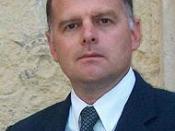Kazuo Ishiguro's The Remains of the Day can be viewed less as a narrative story than as a long character study. The main character of Stevens, the butler of Darlington Hall, acts not only as the narrator of the story but the focal point. Through him we learn about the strictly-regimented life of the English servant class, and the almost cultish social implications associated with holding the position in a household which Stevens has acquired.
Jack Slay Jr. classifies The Remains of the Day as "an intimate portrayal of an utterly English butler through his methodical ruminations on the subjects of greatness and dignity"(Slay). Stevens is obsessively precise and relentless in his pursuit of "dignity". However, this causes him to sublimate his own emotions and desires. This dignity means that Stevens must remain professional and poised, without exception, at all times. As a proper servant he puts his entire faith in his master, Lord Darlington - despite the merits of the other man's actions.
Although Stevens makes us believe he is content to serve this man, and that he believes his actions are noble, we find out at the end of the novel how much he regrets his lack of personal connection to anyone and anything.
Much of Stevens' behavior revolves around and is influenced by his father. He speaks of the man as "indeed the embodiment of 'dignity'" (Ishiguro 34), and tells stories of his father's impossibly formal performance of duties. Stevens wishes to emulate this frighteningly anti-social behavior so strongly that he sacrifices even his own relationship with his idolized father to do so.
Slay agrees with the summarized ideas of other critics in that Stevens has repressed himself to the point where hides any sense of identity from both the world and himself. The fact that he...


